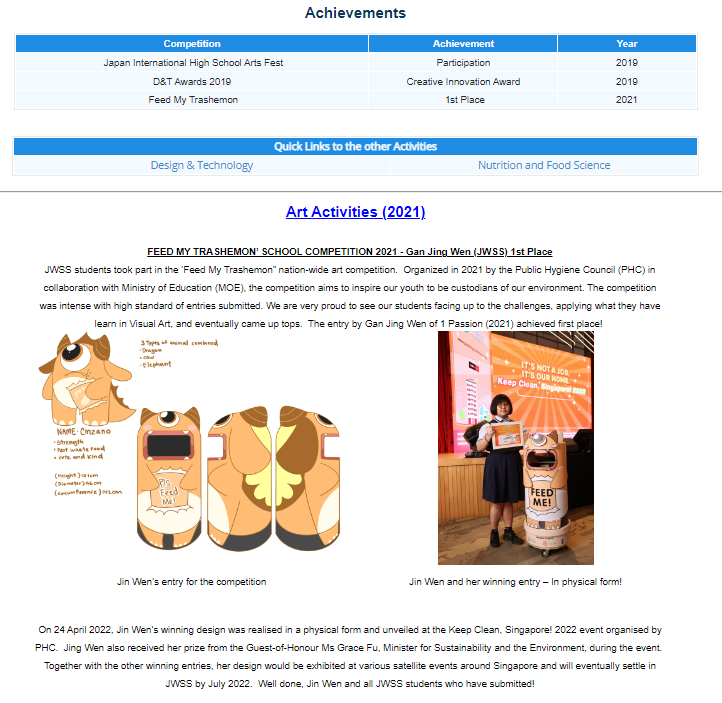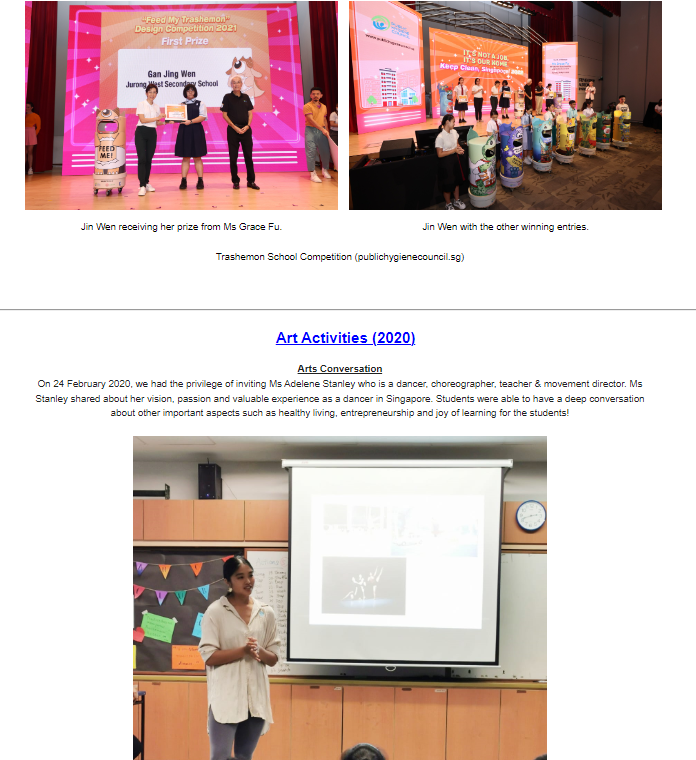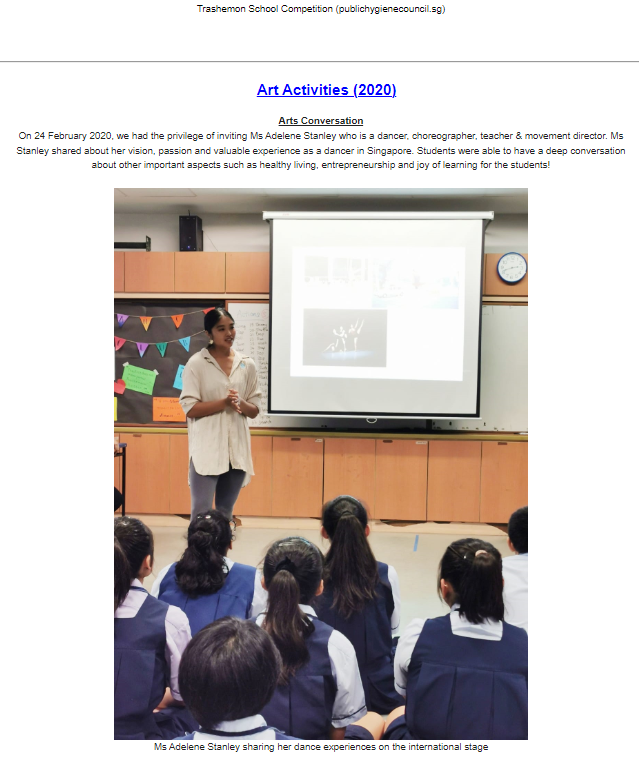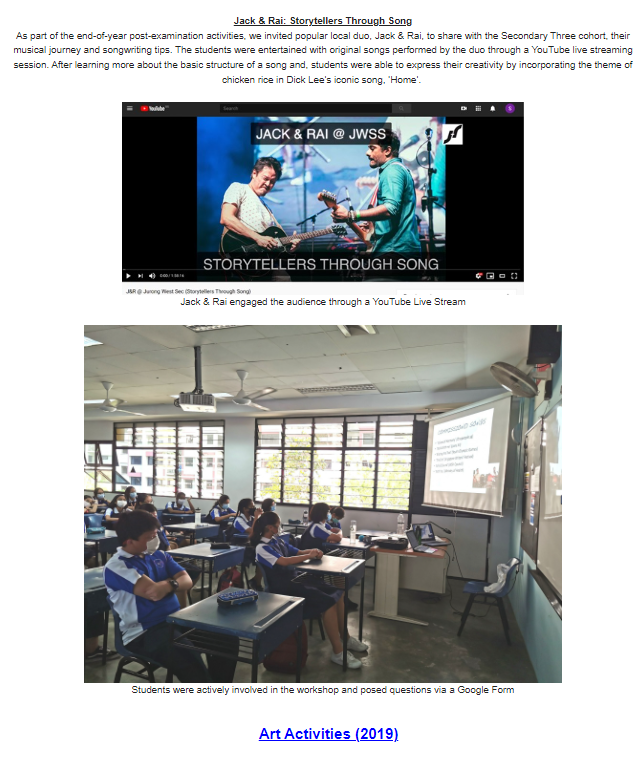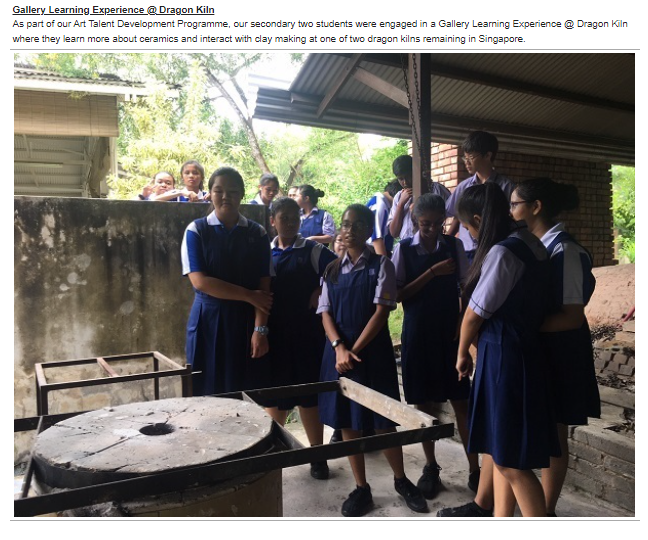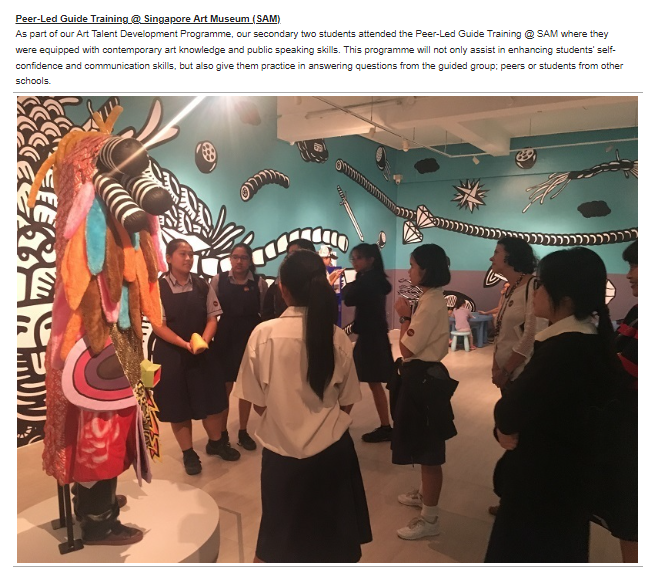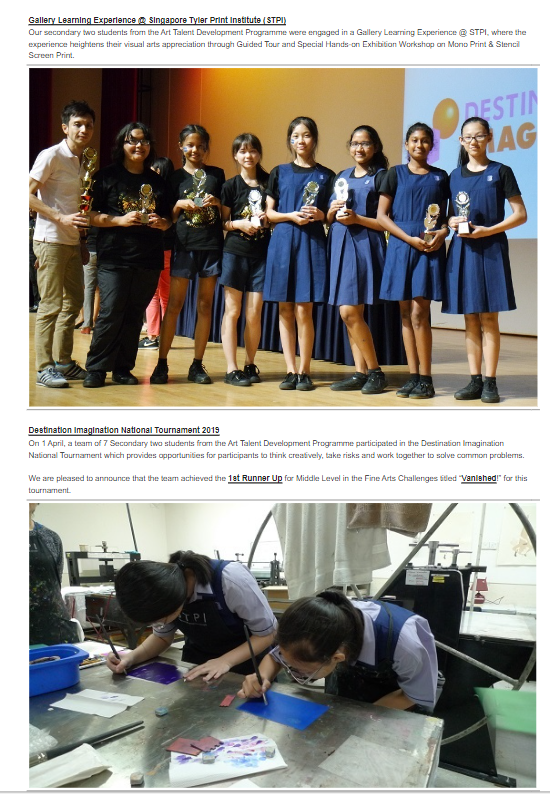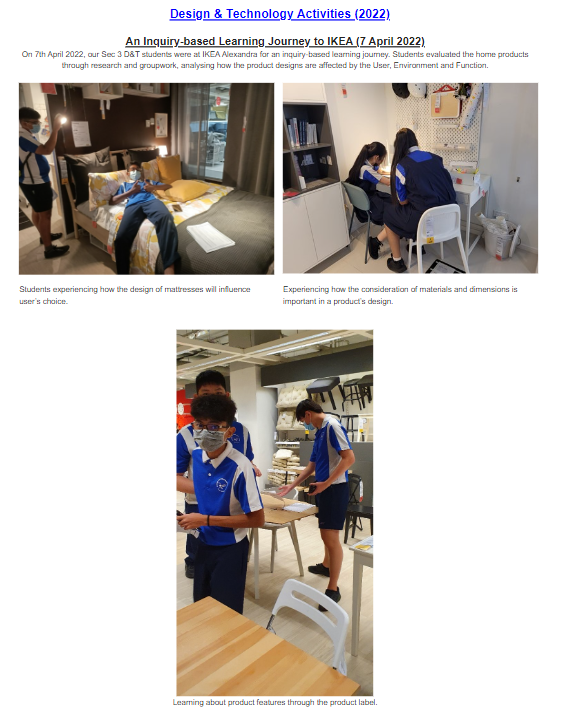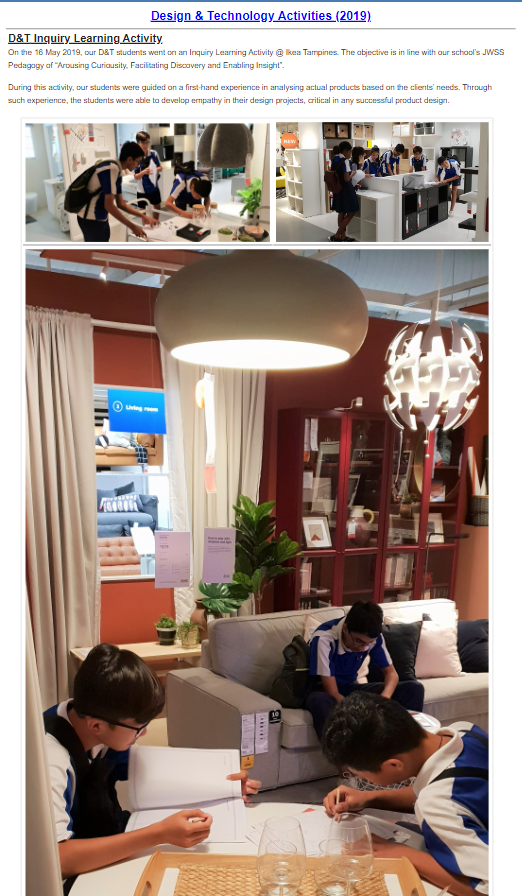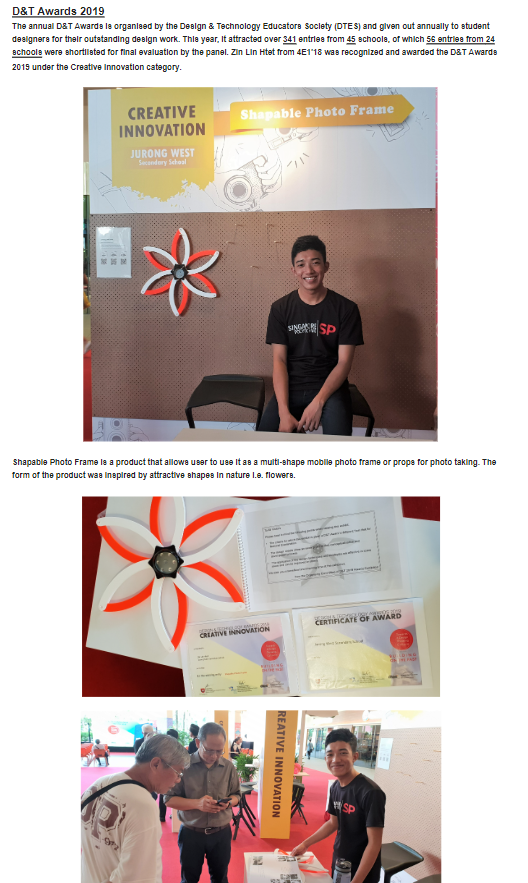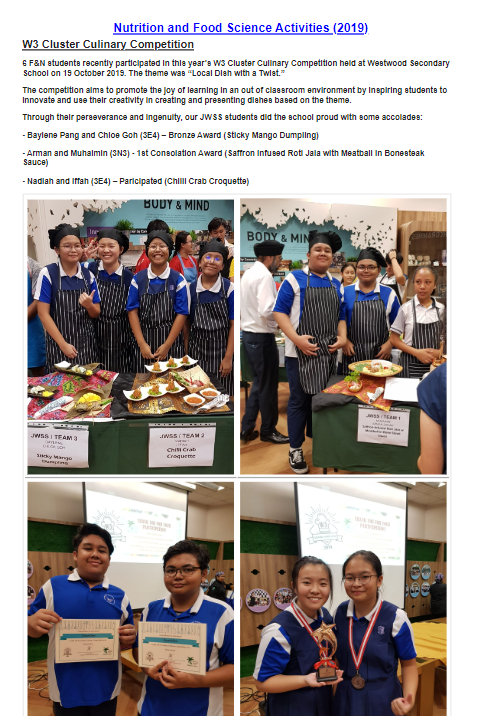Aesthetics, Craft and Technology
Aesthetics, Craft and Technology
Teaching Staff
|
01/ |
Ms Ng Huey Lee
|
02/ |
Mr Faizal Bin Abdul Aziz
|
03/ |
Mr Low Chi Arn Benjamin |
|
04/
|
Mr Nar Soon Keong
|
05/ |
Mr Chong Chee Nian Teacher Design & Technology |
06/ |
Ms Angelene Ho
|
|
07/ |
Mr Mohammad Azri Bin Kasmanni
|
08/ |
Ms Nadirah Binte Yusnaini Wahid Teacher |
09/ |
Mdm Roszilah Abdul Rahim Teacher |
|
10/ |
Ms Mandhiraj Kaur Dhillon Flexi Adjunct Teacher |
11/ |
Mdm Norita Binte Mokhtar Teacher
|
12/ |
Ms Narimah Bte Mohamed Nasir
|
Art
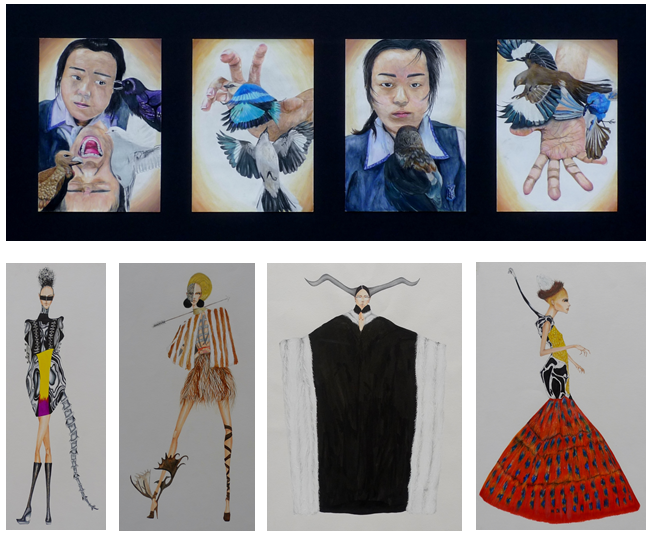
Subjects Offered
General Art Programme
-
Visual Arts @ Lower Secondary
-
‘NT’ Level Art @ Upper Secondary
Enhanced Art Programme (EAP)
-
A JWSS Distinctive Programme ‘O’ Level Art @ Upper Secondary
Art Talent Development Programme (TDP)
-
Lower Secondary
Curriculum
Art is important for students’ holistic development as Art
-
fosters students’ sense of identity, culture and place in society;
-
builds students’ capacity to critically discern and process visual information, and communicate effectively in the 21st Century; and
-
expands imagination and creativity.
Drawing from the value of art in education, the aims and objectives of
the Lower Secondary Art are:
Aims:
Art Education in our schools aims to enable every child to
-
enjoy art,
-
communicate visually, and
-
make meaning through connecting with society and culture.
Objectives:
To develop active artists and informed audience who are imaginative, critically
discerned, confident, curious, innovative, has a lifelong enjoyment for
art; and respect art as part of their understanding of themselves, their
cultural heritage and the world.
At the end of their 2-year Lower Secondary Art Curriculum, students will
be able to do the following:
|
Domains |
Learning Outcomes |
|---|---|
|
Perceive
|
Identify qualities in and interpret what they see and experience
|
|
Communicate
|
Express experiences and ideas in art making
|
|
Appreciate
|
Reflect and share views on their own and others’ art making
|
T & L Framework:
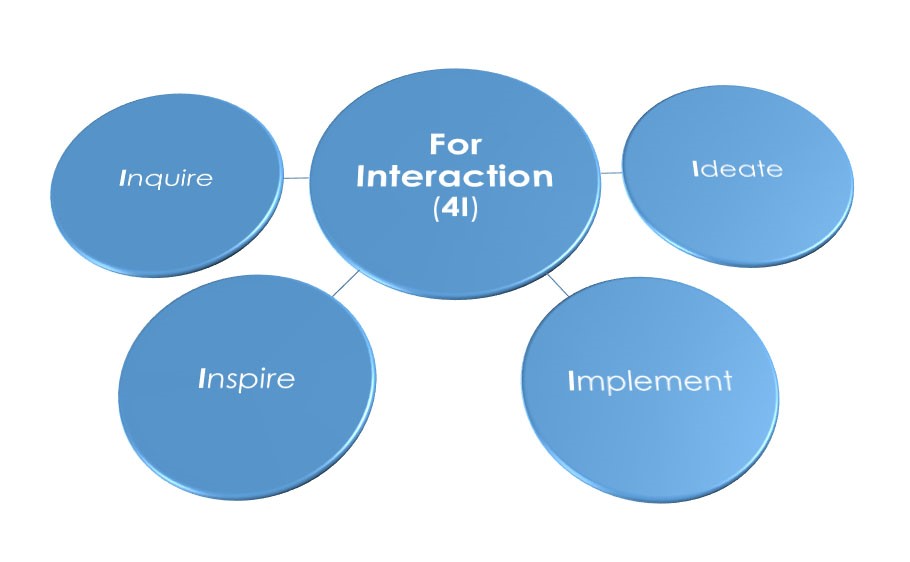
For Interaction (4I) Integrated Learning and Thinking Approach
Design & Technology
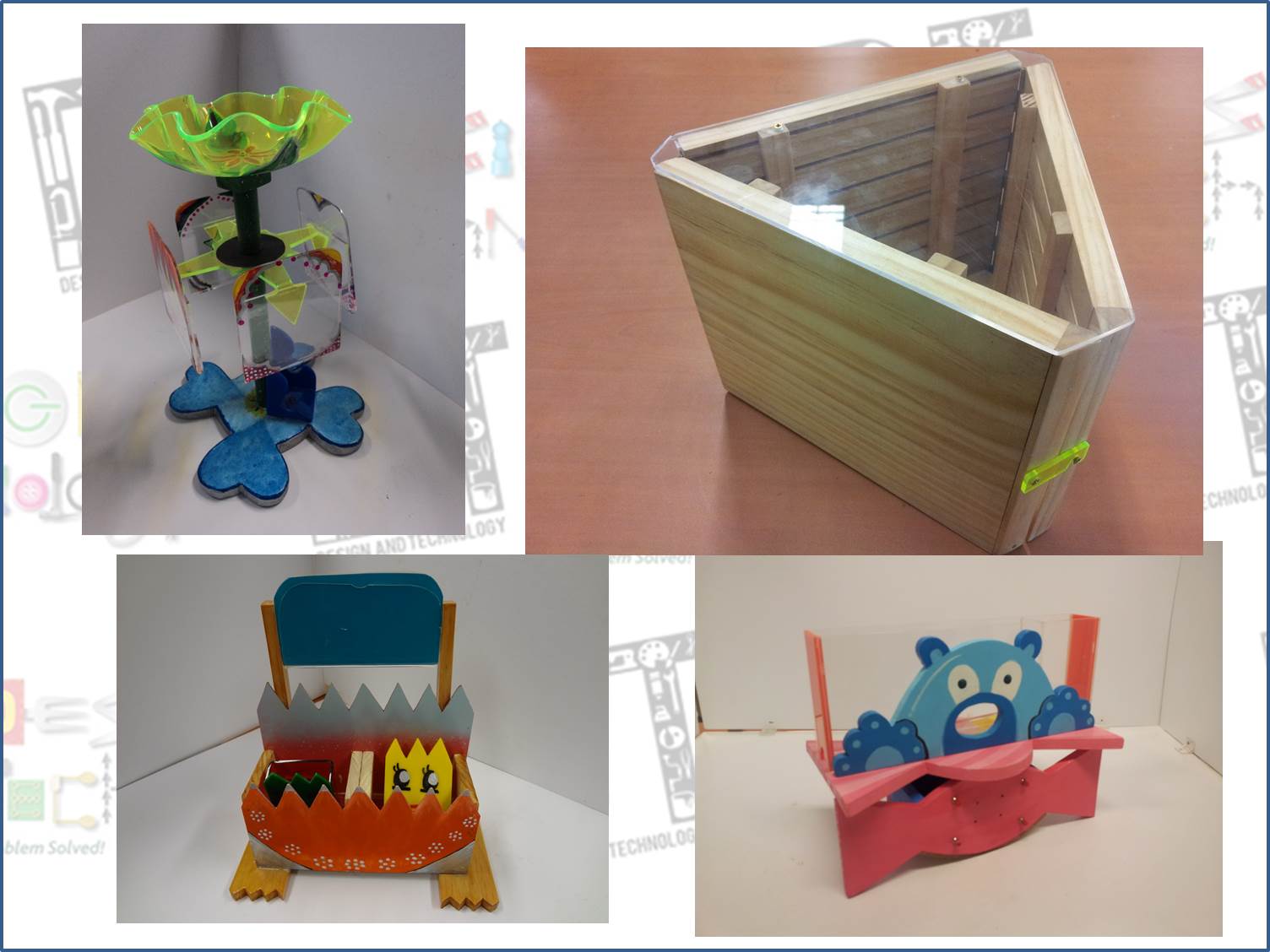
Subject Offered
-
Design & Technology
Curriculum
Lower Secondary Programme:
Design & Technology (D&T) is part of a holistic broad-based education. It is a compulsory project-based subject in the lower secondary school curriculum. D&T anchors on design action and the application of knowledge and process skills.
Students are to engage in design-and-make activities and experience a basic process of design adapted to their abilities, interest and design context.
The lower secondary D&T syllabus aims to enable students to:
-
develop an awareness of design in the made-world;
-
develop an appreciation of function;
-
aesthetics and technology in design;
-
develop basic design thinking and communication skills;
-
experience the process of realising design through making; and
-
think and intervene creatively to become autonomous decision makers.
Upper Secondary Programme:
Our upper secondary programme prepares students for their GCE O/N levels in Secondary 4/5. It is a comprehensive programme to familiarise students with coursework requirements.
Students will also acquire basic knowledge and understanding related to Structures, Mechanisms and Electronics for designing and making controlled systems. They will need to apply the knowledge in one or more technological areas appropriate to the context of their Coursework Projects. The three technological areas can be summarised as follows:
-
Structures – supporting systems designed for minimal movement
-
Mechanisms – movement systems designed to transfer and control physical movement and forces from one point/direction to another
-
Electronics – control systems designed to sense, process and control via electrical signals.
T & L Framework:
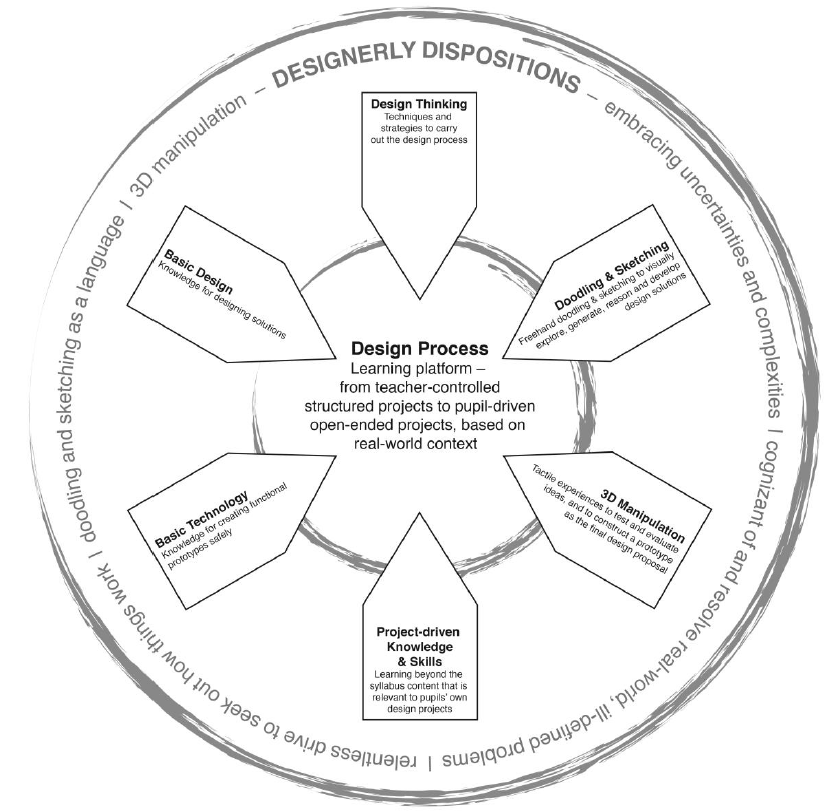
Nutrition and Food Science
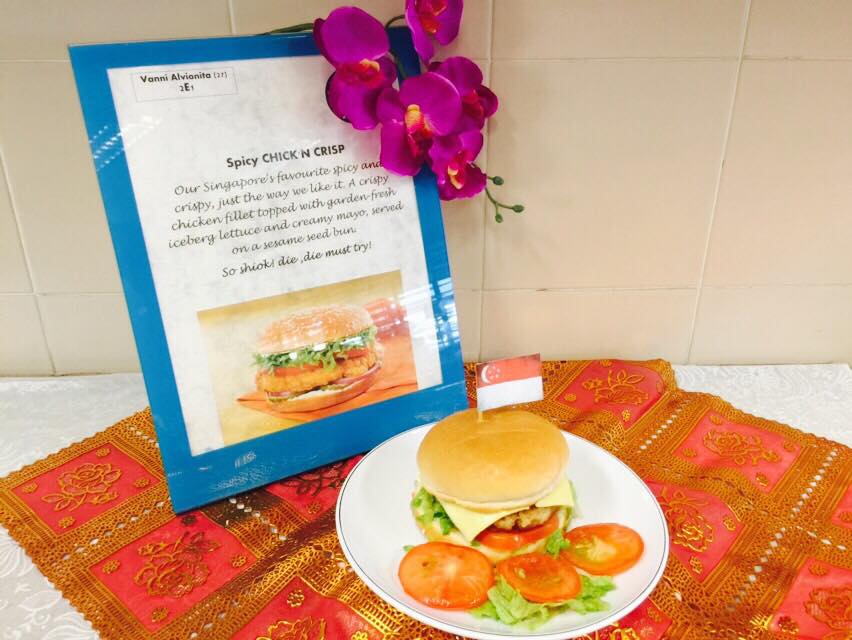
Subjects Offered
-
Food & Consumer Education (FCE) @ Lower Secondary
-
Nutrition and Food Science (NFS) @ Upper Secondary
Curriculum
Lower Secondary Programme:
Food and Consumer Education (FCE) is taken by all lower secondary students in JWSS.
The FCE syllabus is designed to empower students to be health-conscious and discerning consumers; enabling them to better manage their lives for the present and the future. The focus is on how individuals and families optimise their resources of food, finance and time to meet the physical mental, social and economic needs.
The syllabus aims to enable students to
-
understand the importance of nutrition for long-term health;
-
apply basic principles of consumer education;
-
apply basic financial principles for everyday decision making and planning;
-
appreciate and develop an understanding of food, nutrition and trans-cultural awareness in the global context;
-
nurture and develop critical thinking, problem-solving and creativity, a spirit of enterprise, innovation and aesthetic awareness; to make informed and discerning food and consumer-related decision;
-
develop positive attitudes and values for the well-being of the community (families and society); and
-
demonstrate effective and responsible use of resources for the individuals and the community.
The FCE syllabus is designed to prepare students for the 21st Century. Hence, the 21st Century Competencies (21CC) has been integrated into the content, learning process and assessment. FCE is a relevant subject that provides students a foresight to prepare them for the evolving world.
Upper Secondary Programme:
Our upper secondary programme prepares students for their GCE O/N levels in Secondary 4. It is a comprehensive programme to familiarise students with coursework requirements.
The syllabus aims to:
-
develop candidates’ understanding of the concepts of nutrition and meal planning;
-
develop candidates’ understanding of the link between diet and health;
-
develop candidates’ understanding of the principles of food science; and
-
equip candidates with the knowledge and skills to make informed decisions concerning food and nutrition.
Structure of Syllabus:
|
Core areas of study |
1. Food studies 2. Consumer studies |
|
Elective module |
1. Nutrition & Food Science
|
Music
Subjects Offered
-
Music @ Lower Secondary
Curriculum
Lower Secondary Programme:
Music is taken by all lower secondary students in JWSS.
The Music syllabus is designed to provide students with opportunities to explore a wide range of genres and styles to broaden and develop their knowledge, skills and understanding of music. It provides the platform for students to make music, both individually and in groups. demonstrate and articulate an understanding of the elements and concepts of music through listening, performing and creating music. Students will be able to discuss and provide personal responses to the music at greater depth.
The syllabus aims to enable students to
-
Perform Music in both instrumental and vocal settings, individually and in groups
-
Create Music in both instrumental and vocal settings, individually and in groups
-
Listen and Respond to Music
-
Appreciate Music in local and global cultures
-
Understand musical elements and concepts
-
develop positive attitudes and values for the well-being of the community (families and society); and
-
demonstrate effective and responsible use of resources for the individuals and the community.
The syllabus lays the foundation for further study in music and endeavours to foster a lifelong appreciation and involvement in music.
ACT Programme
